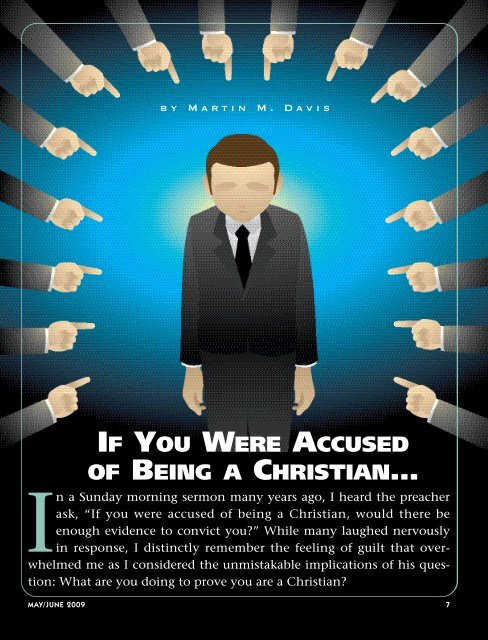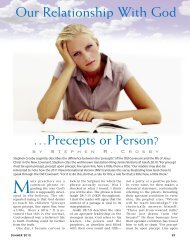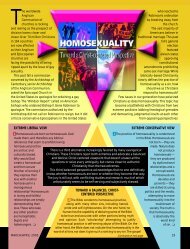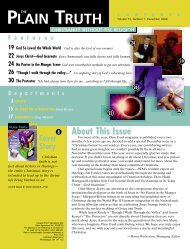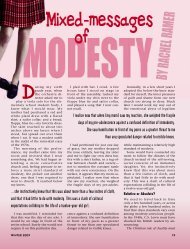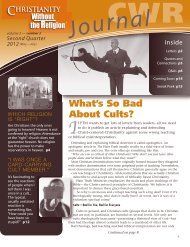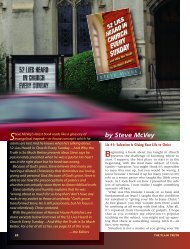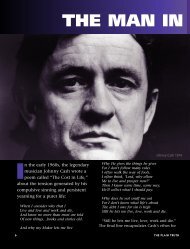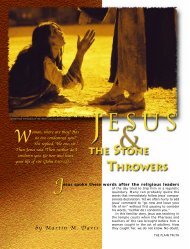If you were accused of being a Christian - Plain Truth Ministries
If you were accused of being a Christian - Plain Truth Ministries
If you were accused of being a Christian - Plain Truth Ministries
Create successful ePaper yourself
Turn your PDF publications into a flip-book with our unique Google optimized e-Paper software.
y Martin M. Davis<br />
IF YOU WERE ACCUSED<br />
OF BEING A CHRISTIAN…<br />
In a Sunday morning sermon many years ago, I heard the preacher<br />
ask, “<strong>If</strong> <strong>you</strong> <strong>were</strong> <strong>accused</strong> <strong>of</strong> <strong>being</strong> a <strong>Christian</strong>, would there be<br />
enough evidence to convict <strong>you</strong>” While many laughed nervously<br />
in response, I distinctly remember the feeling <strong>of</strong> guilt that overwhelmed<br />
me as I considered the unmistakable implications <strong>of</strong> his question:<br />
What are <strong>you</strong> doing to prove <strong>you</strong> are a <strong>Christian</strong><br />
MAY/JUNE 2009 7
Following the surge <strong>of</strong> guilt, I was engulfed in shame as I began to contemplate the<br />
appalling lack <strong>of</strong> evidence to convict me <strong>of</strong> <strong>being</strong> a <strong>Christian</strong>. I didn’t sing in the<br />
choir or teach Sunday School. I hadn’t volunteered to go on a mission trip. I served<br />
on no committees. I refused to go to the men’s fellowship breakfast because I was not<br />
interested in talking about deer hunting or football at 7:30 on Saturday morning.<br />
Worst <strong>of</strong> all, I absolutely detested<br />
the thought <strong>of</strong> “witnessing.”<br />
I hated joining others in my Sunday<br />
School class on Wednesday<br />
evenings to go knocking on someone’s<br />
door unannounced to ask<br />
them if they knew Jesus—or worse,<br />
why they hadn’t been in Sunday<br />
School lately. After a few moments<br />
<strong>of</strong> wallowing in guilt and shame, I<br />
concluded I was a washout as a<br />
<strong>Christian</strong>. No doubt I needed to<br />
say the “sinner’s prayer” and be rebaptized,<br />
because there was little<br />
danger that some wild-eyed secularist<br />
would accuse me <strong>of</strong> <strong>being</strong> a<br />
<strong>Christian</strong>!<br />
“Proving” Our <strong>Christian</strong>ity<br />
As I think back on that fateful Sunday<br />
and the preacher’s damning<br />
question, I wonder what the evidence<br />
might be that would convict<br />
one <strong>of</strong> <strong>being</strong> a <strong>Christian</strong>. Obviously,<br />
there must be something we are<br />
supposed to do that will prove to<br />
A<br />
fter<br />
a few moments <strong>of</strong> wallowing in<br />
guilt and shame, I concluded I was a<br />
washout as a <strong>Christian</strong>.<br />
What are <strong>you</strong><br />
doing to prove<br />
<strong>you</strong> are a <strong>Christian</strong><br />
all and sundry that we are among<br />
the chosen. Though the evidence<br />
may vary from group to group,<br />
surely there are some general<br />
guidelines we can follow to prove<br />
we are <strong>Christian</strong>s.<br />
Perhaps we could prove we are<br />
<strong>Christian</strong>s by our attendance at<br />
church. Enough gold stars for perfect<br />
Sunday attendance would unequivocally<br />
prove that we are<br />
<strong>Christian</strong>s. But then, the nagging<br />
doubt may arise that even perfect<br />
Sunday attendance may not provide<br />
sufficient pro<strong>of</strong> to convict one<br />
<strong>of</strong> <strong>being</strong> a <strong>Christian</strong>. Perhaps perfect<br />
Sunday attendance supplemented<br />
by regular mid-week<br />
attendance would do the job. But<br />
who can say if regular church attendance<br />
is enough<br />
Perhaps we should sing in the<br />
choir, or if we lack good singing<br />
voices, maybe we should volunteer<br />
for nursery duty, or teach teen<br />
church or Sunday School. Doubtless,<br />
perfect attendance punctuated<br />
with a plethora <strong>of</strong> Sunday duties<br />
would provide plenty <strong>of</strong> evidence<br />
that we are <strong>Christian</strong>s.<br />
But what if perfect attendance<br />
and performing Sunday duties do<br />
not provide enough evidence to<br />
convict us <strong>of</strong> <strong>being</strong> <strong>Christian</strong>s<br />
What else might we do to prove we<br />
are the real thing Perhaps there<br />
are things we should do <strong>of</strong>f site, in<br />
our own homes even.<br />
Perhaps we should initiate a<br />
morning quiet time, employing<br />
healthy doses <strong>of</strong> Oswald Chambers<br />
coupled with Scripture. But then,<br />
how long should it be Is fifteen<br />
minutes enough to prove we are<br />
<strong>Christian</strong>s Or should it be thirty<br />
Or even forty-five But, then, what<br />
about my wife She <strong>of</strong>ten leaves<br />
home before 5:00 A.M. in order to<br />
get to school to finish grading papers<br />
before her sixth-graders begin<br />
arriving soon after seven. I suppose<br />
that instead <strong>of</strong> getting up at 4:30,<br />
she could get up at 3:30 for morning<br />
quiet time. Surely that would<br />
prove she is a <strong>Christian</strong>.<br />
“Proving” Our Faith by What We<br />
Don’t Do<br />
After further thought, maybe it<br />
8 THE PLAIN TRUTH
Maybe we should give up beer,<br />
especially those cold frosty ones<br />
they serve along with corn dogs during<br />
hot summer ball games.<br />
would be much easier to prove we<br />
are <strong>Christian</strong>s by what we don’t<br />
do. Maybe we should give up beer,<br />
especially those cold frosty ones<br />
they serve along with corn dogs<br />
during hot summer ball games. Or<br />
maybe we could promise the pastor<br />
we would never venture<br />
inside a casino,<br />
even if only to stick<br />
five-dollars-worth <strong>of</strong><br />
quarters into a slot machine<br />
before heading<br />
for the buffet. Or<br />
maybe we could give<br />
up R-rated movies.<br />
Even better, we could<br />
go the extra mile and<br />
give up movies rated<br />
PG-13, as well. Surely<br />
that would provide<br />
enough evidence to<br />
convict us <strong>of</strong> <strong>being</strong><br />
<strong>Christian</strong>s.<br />
Or maybe we should<br />
fast one day a week—<br />
or maybe two. Even<br />
better, like the desert<br />
monks <strong>of</strong> old, we could<br />
live inside hollow<br />
trees, flagellate ourselves,<br />
wear hair shirts<br />
and never bathe in<br />
order to show our disdain<br />
for the flesh, and<br />
thereby provide ample<br />
evidence to convict us<br />
<strong>of</strong> <strong>being</strong> <strong>Christian</strong>s.<br />
No doubt we begin to realize<br />
that the preacher’s question is<br />
more complicated than it may<br />
have first appeared. Obviously,<br />
providing enough evidence to<br />
prove we are <strong>Christian</strong>s can get<br />
convoluted in a hurry!<br />
A Valid Question<br />
Today, in fact, I strongly contest<br />
the validity <strong>of</strong> the question. I think<br />
that, intended or not, the question<br />
is bound to shame its hearers, particularly<br />
those who don’t teach<br />
Sunday School, sing in the choir or<br />
serve on committees. Moreover, I<br />
now realize that the question hides<br />
an implicit legalism that suggests<br />
our <strong>Christian</strong>ity is measured by externals.<br />
The evidence required to<br />
prove one is a <strong>Christian</strong> may be<br />
nothing more than adherence to a<br />
prescribed set <strong>of</strong> rules, much like a<br />
recipe for <strong>Christian</strong> living.<br />
We may fail to see, however, that<br />
even meticulous adherence to an<br />
external code <strong>of</strong> conduct is no<br />
guarantee that a person is a <strong>Christian</strong>.<br />
Remember the Pharisees <strong>of</strong> Jesus’<br />
day They <strong>were</strong> the greatest<br />
rule-keepers in history. In fact,<br />
Jesus never disputed their ability to<br />
adhere to external codes <strong>of</strong> conduct.<br />
Nevertheless, he compared<br />
them to “white washed tombs,<br />
which look beautiful on the outside<br />
but on the inside are full <strong>of</strong><br />
dead men’s bones and everything<br />
unclean” (Matthew 23:27). Not a<br />
pretty picture! Obviously, considering<br />
Jesus’ harsh words about the<br />
Pharisees, we may conclude that<br />
there must be more to <strong>being</strong> a<br />
<strong>Christian</strong> than external<br />
behavior can<br />
evidence.<br />
<strong>If</strong> Not Deeds, What<br />
About Creeds<br />
Since externals cannot<br />
provide trustworthy<br />
evidence to<br />
convict us <strong>of</strong> <strong>being</strong><br />
<strong>Christian</strong>s, perhaps<br />
we should look for<br />
internal evidence <strong>of</strong><br />
our faith. Maybe a<br />
<strong>Christian</strong> is someone<br />
who believes a<br />
certain set <strong>of</strong> theological<br />
propositions.<br />
But whose theological<br />
propositions<br />
must we believe to<br />
prove we are <strong>Christian</strong>s<br />
<strong>If</strong> we believe in<br />
the perseverance <strong>of</strong><br />
the saints (“once<br />
saved always saved”)<br />
does that mean that<br />
those who believe<br />
we can fall from<br />
grace are not <strong>Christian</strong>s<br />
Where exactly do we draw<br />
the line between orthodoxy and<br />
heresy Who makes that decision<br />
I am convinced that the measure<br />
<strong>of</strong> <strong>Christian</strong>ity has little to do with<br />
doctrinal purity. To illustrate, my<br />
brother-in-law was, for decades, a<br />
The indisputable pro<strong>of</strong> that we are<br />
<strong>Christian</strong>s is that we love each<br />
other as Christ loves us. It is as simple<br />
(and as difficult!) as that.<br />
MAY/JUNE 2009 9
The new covenant reveals that we do not generate God’s love;<br />
rather it is the Holy Spirit who produces the love <strong>of</strong> God<br />
within us, for love is the fruit <strong>of</strong> the Spirit (Galatians 5:22).<br />
Love flows from<br />
God and into<br />
our lives so that we<br />
might share it with<br />
others.<br />
member <strong>of</strong> a cult on the fringe <strong>of</strong><br />
<strong>Christian</strong>ity. At one time, his theology<br />
was different in many ways<br />
from mainstream <strong>Christian</strong>ity. Yet<br />
I have never known anyone who<br />
loves God more or who seemed to<br />
set a better example <strong>of</strong> Christ-like<br />
love to his family, friends and<br />
employees.<br />
On the other hand, as a seminary<br />
graduate, I have known others who<br />
held impeccable theological credentials<br />
but <strong>were</strong> uninspiring examples<br />
<strong>of</strong> what we shall see is the<br />
essential element <strong>of</strong> <strong>Christian</strong>ity.<br />
George MacDonald, whom C.S.<br />
Lewis referred to as a mentor, said<br />
that an atheist who did the will <strong>of</strong><br />
God was better <strong>of</strong>f than a “believer”<br />
who did not. At least the atheist<br />
would not have to explain to Jesus<br />
why he called him Lord but did not<br />
do the things he said!<br />
Do not misunderstand me. As<br />
one who holds to the teachings <strong>of</strong><br />
historical <strong>Christian</strong>ity<br />
as expressed in<br />
the ancient creeds,<br />
I do not minimize<br />
the importance <strong>of</strong><br />
doctrine.<br />
Yet merely holding<br />
the “correct”<br />
doctrine does not<br />
make us <strong>Christian</strong>s<br />
(remember, even<br />
the demons believe!).<br />
Obviously,<br />
the question is not<br />
as simple as the<br />
preacher who asked<br />
it years ago may<br />
have thought.<br />
Our Fundamental Identity<br />
So, what is the evidence that<br />
would convict us <strong>of</strong> <strong>being</strong> <strong>Christian</strong>s<br />
Jesus himself provides the<br />
answer to the preacher’s question.<br />
He gives us an irrefutable<br />
means to prove that we are<br />
<strong>Christian</strong>s. He said, “A new command<br />
I give <strong>you</strong>: Love<br />
one another. As I have<br />
loved <strong>you</strong>, so <strong>you</strong><br />
must love one another.<br />
By this all men will<br />
know that <strong>you</strong> are my<br />
disciples, if <strong>you</strong> love one<br />
another” (John 13:34-<br />
35, emphasis added).<br />
The indisputable<br />
pro<strong>of</strong> that we are<br />
<strong>Christian</strong>s is that we<br />
love each other as<br />
Christ loves us. It is as<br />
simple (and as difficult!)<br />
as that. Jesus<br />
Christ himself provides<br />
the supreme<br />
example <strong>of</strong> love by<br />
giving his life for us.<br />
“Greater love has no one than<br />
this,” he said, “that he lay down<br />
his life for his friends” (John<br />
15:13).<br />
Not only in his sacrificial<br />
death, but also in his teachings<br />
and practice, Jesus shows us how<br />
to live a life <strong>of</strong> love and, thus,<br />
prove that we are his disciples.<br />
Jesus <strong>of</strong>fers some specific examples<br />
(not rules) <strong>of</strong> how we can demonstrate<br />
our love. He tells us to help<br />
those in need and to do it so privately<br />
and unostentatiously that<br />
not even our left hand will know<br />
what our right hand is doing<br />
(Matthew 6:1-4).<br />
He instructs us not to judge others<br />
and to avoid beholding the<br />
speck in another’s eye while we<br />
ignore the plank in our own<br />
(Matthew 7:1-5). He says that if<br />
someone wants to sue us and take<br />
our shirt, we should <strong>of</strong>fer our coat,<br />
as well. He tells us that if someone<br />
compels us to go one mile, we<br />
should not hesitate to go another<br />
(Matthew 5:40-42). He even goes<br />
so far as to command us to love<br />
...I strongly<br />
contest<br />
the validity <strong>of</strong> the<br />
question.... Moreover,<br />
I now realize that<br />
the question hides<br />
an implicit legalism<br />
that suggests our<br />
<strong>Christian</strong>ity is<br />
measured by<br />
externals.<br />
10
our enemies, to do good<br />
to those who hate us, to<br />
bless those who curse us,<br />
and to pray for those who<br />
mistreat us (Luke 6:27-28).<br />
The Apostle Paul encapsulates<br />
the spirit <strong>of</strong> Jesus’<br />
teaching in his unparalleled<br />
exposition <strong>of</strong> love.<br />
He writes, “<strong>If</strong> I speak in<br />
the tongues <strong>of</strong> men and <strong>of</strong><br />
angels, but have not love,<br />
I am only a resounding<br />
gong or a clanging cymbal.<br />
<strong>If</strong> I have the gift <strong>of</strong><br />
prophecy and can fathom<br />
all mysteries and all<br />
knowledge, and if I have a<br />
faith that can move<br />
mountains, but have not<br />
love, I am nothing. <strong>If</strong> I<br />
give all I possess to the<br />
poor and surrender my<br />
body to the flames, but<br />
have not love, I gain<br />
nothing” (1 Corinthians<br />
13:1-3).<br />
Perhaps we could risk a<br />
daring paraphrase <strong>of</strong> what<br />
Paul is saying: “<strong>If</strong> I go to<br />
church three times a week,<br />
serve on six committees,<br />
teach Sunday School, sing<br />
in the choir and volunteer<br />
for mission trips to the<br />
Amazon—and have not<br />
love, I have missed the<br />
point.”<br />
Paul goes on to say,<br />
“Love is patient, love is<br />
kind. It does not envy, it<br />
does not boast, it is not<br />
proud. It is not rude, it is<br />
not self-seeking, it is not<br />
easily angered, it keeps no<br />
record <strong>of</strong> wrongs. Love<br />
does not delight in evil<br />
but rejoices with the<br />
truth. It always protects,<br />
always trusts, always<br />
hopes, always perseveres.<br />
Love never fails” (1<br />
Corinthians 13:4-8).<br />
Authentic <strong>Christian</strong>ity<br />
Perhaps after pondering Jesus’<br />
command to love, as well as Paul’s<br />
description <strong>of</strong> what that kind <strong>of</strong><br />
love looks like, we may wish that<br />
<strong>Christian</strong>ity could be reduced to<br />
...J<br />
esus shows us how to<br />
live a life <strong>of</strong> love and,<br />
thus, prove that we are<br />
his disciples.<br />
Like an explorer who treks<br />
through the wilderness<br />
guided by a compass,<br />
<strong>Christian</strong>s who seek the way <strong>of</strong><br />
Christ also use a compass, one<br />
whose needle always points in<br />
the direction <strong>of</strong> God’s love.<br />
mere externals like church attendance<br />
or refraining from alcohol.<br />
Nevertheless, Jesus gives us only<br />
two great, overarching commandments—he<br />
tells us to love God with<br />
all our heart, soul and mind, and<br />
to love our neighbor as our<br />
self. According to Jesus,<br />
“All the Law and Prophets<br />
hang on these two commandments”<br />
(Matthew<br />
22:36-40).<br />
All the rules and regulations,<br />
all the prescriptions<br />
for ethical behavior, all the<br />
evidence that could be<br />
used to convict us <strong>of</strong> <strong>being</strong><br />
<strong>Christian</strong>s can be reduced<br />
to one word: love.<br />
Of course, the admonition<br />
to “love one another”<br />
can easily become yet<br />
another legalistic, performance-based<br />
requirement.<br />
The admonition is given,<br />
however, within the context<br />
<strong>of</strong> the new covenant.<br />
The new covenant teaches<br />
us that “God has poured<br />
out his love into our hearts<br />
by the Holy Spirit, whom<br />
he has given us” (Romans<br />
5:5).<br />
The new covenant reveals<br />
that we do not<br />
generate God’s love; rather<br />
it is the Holy Spirit who<br />
produces the love <strong>of</strong> God<br />
within us, for love is the<br />
fruit <strong>of</strong> the Spirit (Galatians<br />
5:22). Love flows<br />
from God and into our<br />
lives so that we might<br />
share it with others.<br />
Like an explorer who<br />
treks through the wilderness<br />
guided by a compass,<br />
<strong>Christian</strong>s who seek the<br />
way <strong>of</strong> Christ also use a<br />
compass, one whose needle<br />
always points in the<br />
direction <strong>of</strong> God’s love.<br />
As we follow the path <strong>of</strong><br />
love, empo<strong>were</strong>d by the<br />
Holy Spirit to share the<br />
love <strong>of</strong> God to those<br />
around us, we will provide<br />
the evidence to convict us<br />
<strong>of</strong> <strong>being</strong> <strong>Christian</strong>s. ❑<br />
Martin M. Davis is an author and<br />
retired Family Therapist. To learn<br />
more about his book, Ashes into<br />
Gold: The Journey <strong>of</strong> Spirituality,<br />
just visit www.mannabooks.org or<br />
www.martinmdavis.blogspot.com.<br />
MAY/JUNE 2009 11


